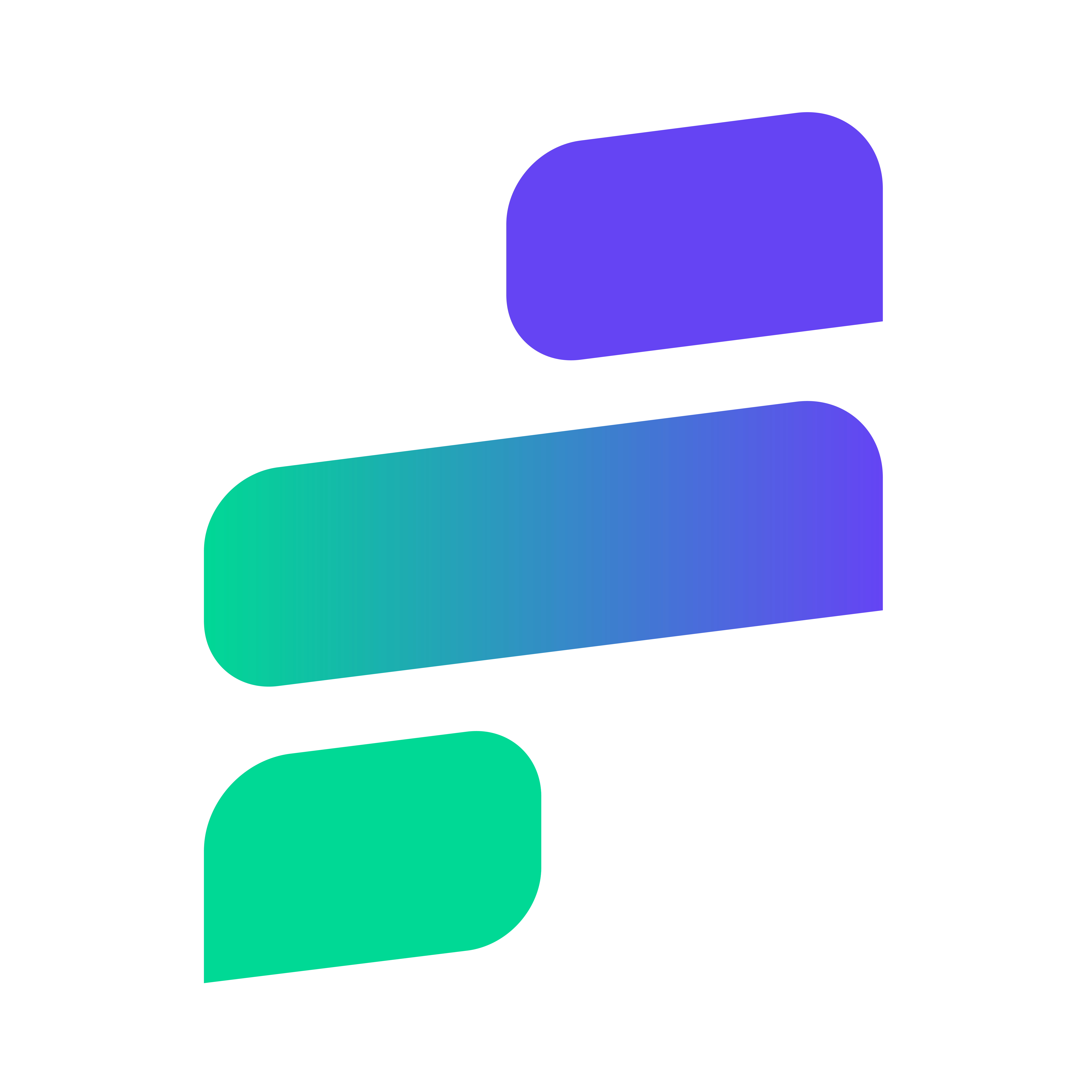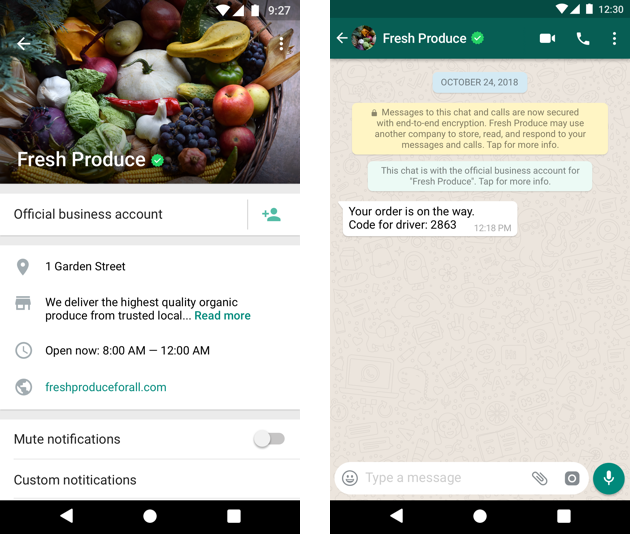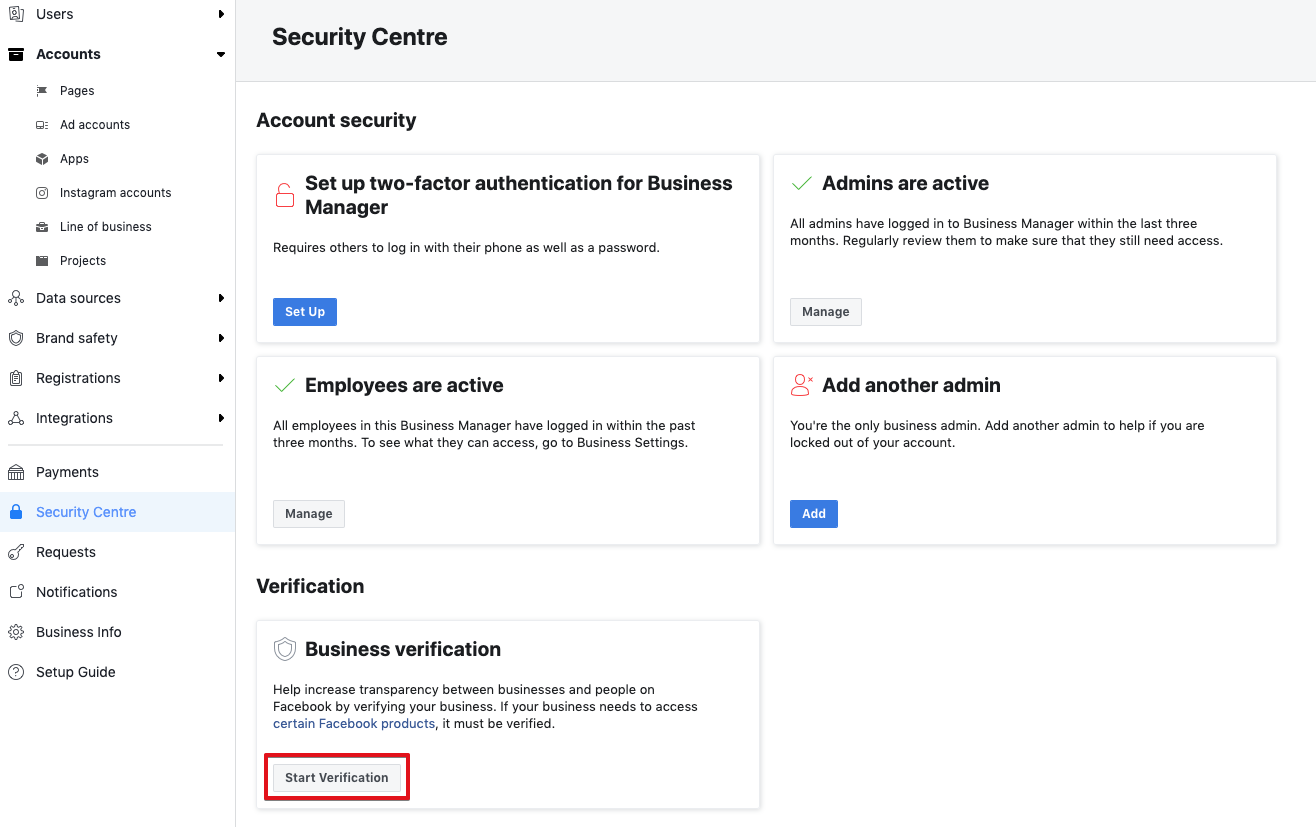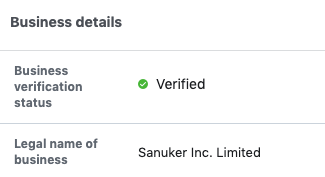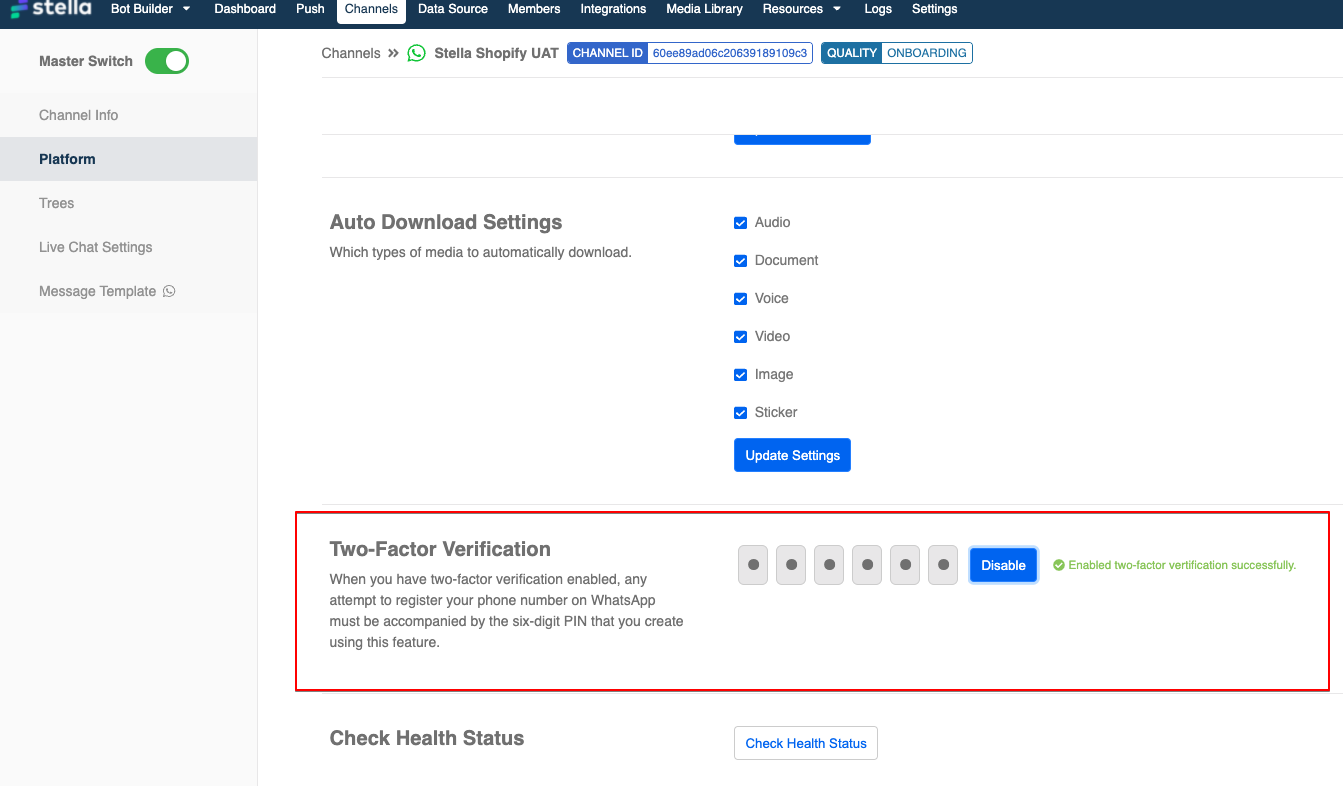WhatsApp Overview
Comparing with other messaging platforms, WhatsApp has a stricter requirement and here're a few things you should pay attention to when you plan to create digital presence on WhatsApp Business.
WhatsApp Business API
WhatsApp business API helps businesses onboard and build their first official WhatsApp messaging experience. WhatsApp business API is different from that WhatsApp business app on Android. Stella has integrated with WhatsApp business API and allows our users to create chatbot through our platform.
Registering as a business will unlock features such as:
- Industry Information: People can now easily identify your business by its category or industry and find out more information (i.e., hours of operation, website, location, description).
- Send and Receive: Enable two-way high value conversations with customers.
- Message Templates: Create message formats that are needed for sending notifications to users.
WABA Setup Procedure
Please see WhatsApp Setup Procedure for more details.
Supported Message Types
Please see Message Types for supported message types on WhatsApp business.
Conversations
With the WhatsApp Cloud API, the usage and charges are measured based on the concept of Conversations.
A conversation is measured in fixed 24-hour sessions, it starts when the first business message in a conversation is delivered, either initiated by the business or in reply to a user message.
The businesses will be charged per 24-hour conversation. Within a 24 hour conversation session, businesses and users can exchange any number of free form messages or template messages under the same category without additional charges, given that the messages being sent do not initial a new conversation of another category.
Conversation Categories
| Category | Type | Description |
|---|---|---|
| Utility | Business-initiated | Facilitate a specific, agreed-upon request or transaction or update to a customer about an ongoing transaction, including post-purchase notifications and recurring billing statements |
| Authentication | Business-initiated | Enable businesses to authenticate users with one-time passcodes, potentially at multiple steps in the login process (e.g. account verification, account recovery, integrity challenges) |
| Marketing | Business-initiated | Include promotions or offers, informational updates, or invitations for customers to respond / take action. Any conversation that does not qualify as utility or authentication is a marketing conversation. |
| Service | User-initiated | Messages sent by the business in response to the customers' enquiries. |
Pricing (Effective on June 1, 2023)
The conversation charges will vary based on the template category. When a template is delivered, it opens a new chargeable conversation under that category, unless the template is delivered during an open conversation of the same category. Multiple templates of the same category within an open conversation will not result in additional charges.
Service conversations will still only be initiated when no other conversation window is open and a business responds with a free form message within the 24-hour customer service window.
Scenario 1: Sending a marketing template inside a marketing conversation.
Chargeable Conversation:One marketing conversation.
Scenario 2: Sending a free form message inside a service conversation.
Chargeable Conversation: One service conversation.
However, if a template of a different category is sent within an open conversation, a separate chargeable conversation will be opened.
If a business replies with a template message in an open service conversation, this will also create a separate conversation based on the template category.
Scenario 1: Sending a marketing template inside an utility conversation.
Chargeable Conversation: One utility conversation and one marketing conversation.
Scenario 2: Sending a authentication template inside a service conversation.
Chargeable Conversation: One service conversation and one authentication conversation.
The only exception is the Free Entry Point conversations, which allow businesses to send multiple templates of different categories within free window and no new conversation will be opened.
The rates for business-initiated and user-initiated conversations vary by country or region. For the detailed rates, please refer to the rate cards.
Free Entry Point
If a conversation is initiated using the call-to-actions buttons on Ad that click to WhatsApp or the Facebook Page call-to-action buttons, this conversation is considered as a Free Entry Point conversation which will be not charged.
The free window will last for 72 hours, no other conversation category can be created within this window, even if a business sends a message template of any category.
Please note that the conversation initiated from the ad is free, but the business still needs to pay for the ad itself.
Free Tier
Changes to Free Tier Conversations: Effective June 1, 2023 This will not apply to businesses managed by Business Solution Providers, or businesses that did not rely on the services of a Meta partner to integrate the On-Premises API, until June 1, 2023. For all other accounts, this takes effect on April 1, 2023.
Each WhatsApp Business Account (WABA) can receive free tier conversations of 1000 user-initiated conversations each month, which is independent of the number of phone numbers attached to the WABA. The business-initiated conversation is not covered by the free tier. The free tier will be refreshed monthly based on the timezone associated with the WABA.
This will not apply to businesses managed by Business Solution Providers, or businesses that did not rely on the services of a Meta partner to integrate the On-Premises API, until June 1, 2023.
For all other accounts, this takes effect on April 1, 2023.
Templated Messages
Message Templates are message formats for common reusable messages a business may want to send. Businesses must use Message Templates for sending notifications to customers. This allows a business to send just the template identifier along with the appropriate parameters instead of the full message content. Your message templates will be reviewed manually to ensure they do not violate WhatsApp policies.
Supported Categories
WhatsApp currently supports the following types of message templates:
| Category | Description |
|---|---|
| Authentication | Send codes to verify a transaction or login. |
| Marketing | Send promotions or information about your products, services or business. |
| Utility | Send messages about an existing order or account. |
In order to avoid your templates being rejected by WhatsApp, please make sure the purpose of your template matches with the category.
Supported Languages
The following are the supported languages for message templates. You can refer to here for the full list of supported languages.
| Language (A-K) | Code | Language (L-Z) | Code |
|---|---|---|---|
| Afrikaans | af | Lao | lo |
| Albanian | sq | Latvian | lv |
| Arabic | ar | Lithuanian | lt |
| Azerbaijani | az | Macedonian | mk |
| Bengali | bn | Malay | ms |
| Bulgarian | bg | Malayalam | ml |
| Catalan | ca | Marathi | mr |
| Chinese (CHN) | zh_CN | Norwegian | nb |
| Chinese (HKG) | zh_HK | Persian | fa |
| Chinese (TAIWAN) | zh_TW | Polish | pl |
| Croatian | hr | Portuguese (BR) | pt_BR |
| Czech | cs | Portuguese (POR) | pt_PT |
| Danish | da | Punjabi | pa |
| Dutch | nl | Romanian | ro |
| English | en | Russian | ru |
| English (UK) | en_GB | Serbian | sr |
| English (US) | en_US | Slovak | sk |
| Estonian | et | Slovenian | sl |
| Filipino | fil | Spanish | es |
| Finnish | fi | Spanish (ARG) | es_AR |
| French | fr | Spanish (MEX) | es_MX |
| Georgian | ka | Spanish (SPA) | es_ES |
| German | de | Swahili | sw |
| Greek | el | Swedish | sv |
| Gujarati | gu | Tamil | ta |
| Hausa | ha | Telugu | te |
| Hebrew | he | Thai | th |
| Hindi | hi | Turkish | tr |
| Hungarian | hu | Ukrainian | uk |
| Indonesian | id | Urdu | ur |
| Irish | ga | Uzbek | uz |
| Italian | it | Vietnamese | vi |
| Japanese | ja | Zulu | zu |
| Kannada | kn | ||
| Kazakh | kk | ||
| Kinyarwanda | rw_RW | ||
| Korean | ko | ||
| Kyrgyz (Kyrgyzstan) | ky_KG |
Pricing (Effective until May 31, 2023)
The following pricing model will be deprecated. The new conversation-based pricing will be effective on June 1, 2023.
Starting from 1 February 2022, WhatsApp has started to adopt the Conversation-Based Pricing model. Business will be charged per conversation, which includes all messages delivered in a 24 hour session.
Conversation
A conversation is measured in fixed 24-hour sessions, it starts when the first business message in a conversation is delivered, either initiated by the business or in reply to a user message.
Within a 24 hour conversation session,businesses and users can exchange any number of messages (including template messages) without incurring additional charges. Each 24 hour conversation session results in a single charge.
Conversations are divided into two categories:
| Category | Description |
|---|---|
| User Initiated | A conversation that initiates in response to a user message. Whenever a business replies to a user within the 24 hour customer service window, that message will be associated with a user-initiated conversation. Businesses can send free-form messages within this 24 hour customer service window. |
| Business Initiated | A conversation that initiates from a business sending a user a message outside the 24 hour customer service window. Messages that initiate a business-initiated conversation will require a message template. |
Rates
Conversations will be charged based on category and locations. The rates are publish in our website.
Free Tier Conversations
Each WhatsApp Business account (WABA) will receive 1,000 free conversations per month. These conversations can be either user or business-initiated. The free tier is refreshed monthly based on the timezone associated with the WABA.
The free tier is provided at WABA level. Even if your WABA has multiple numbers, the free tier threshold will still be 1000 conversations.
Quality Based Message (QBM)
In September 2021, WhatsApp has globally launched the quality based message, and let businesses engage their customers in full-funnel conversations via WhatsApp Business API. New types of messages including product recommendations, back-in-stock alerts, timely offers, informational alerts, are allowed to be sent without the transactional-only restriction on messages outside the 24-hour window.
Businesses should do the following:
- Obtain opt-in from customers before sedning business-initiated messages.
- Apply an experiemental-based approach to see what resonates with customers.
- The process of message template creation remains the same.
- Choose an existing template category during submission.
- Make sure the template doesn't violate the Commerce or Business Policy.
- Plan in advance to account for review times.
Regarding the WhatsApp Business Policy:
- Transactional-only requirement for business-initiated chats outside the 24-hour window has been removed.
- Opt-in policy remains unchagned, please refer to "Opt-In Best Practices" (bottom of the page) for the best practice.
Please note that users can still block or report a business at any time, WhatsApp might rate limit or remove specific templates if a business's quality rating is low for a sustained period of time.
Rejection
After review by the WhatsApp team, the templated message can be rejected, the reason might be one of the following.
Inncorrect Format
- Messages with misspellings or grammatical errors;
- Incorrect use of variable parameters;
- Selected language doesn't match with the content, etc.
Violation of WhatsApp’s Business Policy
- Content irrelevant to goods and services provided by the business;
- Involving transaction of goods and services restricted by WhatsApp such as drugs, tobacco, alcohol, etc
Potentially Abusive or Threatening Content
- Messages that threaten customers with a legal course of action;
- Messages that threaten to add customers to a WhatsApp group with their friends and family to shame them if they don't pay back their loans
For the detailed guidelines, please refer to WhatsApp Message Template Guidelines.
Opt-in
A user must first consent to receive messages in WhatsApp by opting into them via WhatsApp or a third-party channel. This can be any channel your business uses to communicate with people today — your WhatsApp thread, interactive voice response (IVR) flows, website, app, email, SMS, retail location, etc.
You must follow the below requirements when obtaining opt-in:
- You must clearly state that a person is opting in to receive messages from the business over WhatsApp
- You must clearly state the business’ name that a person is opting in to receive messages from
- You must comply with applicable law
You should continue to optimize for the user experience while obtaining opt-in. For example, you should:
- Explicitly call out the types of messages a person is opting into (e.g., delivery updates)
- Avoid messaging people too frequently
- Provide instructions for how customers can opt out and honor these requests
- Monitor your quality rating, especially when rolling out new opt-in methods
For detailed opt-in requirements, please refer to WhatsApp Opt-in Guidelines.
Verified WhatsApp Business Account
There are two types of WhatsApp Business Accounts:
| Name | Description |
|---|---|
| Official Business Account | WhatsApp has verified that an authentic brand owns this account. An Official Business Account has a green checkmark badge in its profile and next to the header in the chat thread. The name of the business is visible even if the user hasn't added the business to their address book. Very few businesses will be an Official Business Account. Being verified on Facebook or Instagram will not help your business be an Official Business Account. |
| Business Account | Any account that is using the WhatsApp Business API is by default a Business Account. |
Official Business Account
If the WhatsApp Account is an Official Business Account, the Verified Name will be visible in the chat list, chat screens, chat groups, and contacts view instead of the phone number. There will be a green checkmark beside the displayed name in the contacts view.
To apply for an Official Business Account, WhatsApp requires businesses to complete Business Verification and enable Two-step Verification during WhatsApp Account Registration.
Business Verification
You will have to complete verification for your Facebook Business Manager, please refer to the steps given here. Once your business is verified, you will be able to see your business verification status as "verified".
Two-step Verification
You can also need to set up a code for two-step verification in "Platform" under "Channels".
Rate Limit
| Items | Description |
|---|---|
| Request rate limiting | "Request rate limiting" is the throttling of incoming requests on an API endpoint. Beginning with v2.25.3, the request rate limit for the messages endpoint is 50 requests per second with bursts allowed up to 150 requests per second. For details, please click here. |
| Concurrent rate limiting | "Concurrent rate limiting" is the throttling of incoming requests when the Coreapp itself is under heavy load For details, please click here. |
| Messaging Limit | Messaging limits determine how many unique users your business can send messages to on a daily basis. - Tier 1: Allows your business to send messages to 1K unique customers in a rolling 24-hour period. - Tier 2: Allows your business to send messages to 10K unique customers in a rolling 24-hour period. - Tier 3: Allows your business to send messages to 100K unique customers in a rolling 24-hour period. For details, please click here. |
